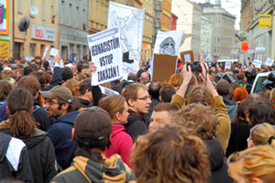“Brno Blokuje” (which means “Brno resists”) brought out close to 2,000 people of goodwill to oppose the ideology of exclusion that had summoned about 300 neo-Nazis to march through the Roma ghetto in Brno on May 1.
Marches in prior years have resulted in violent confrontations. Our Polish and Czech friends were concerned that we would end up hurt, or in jail, or worse. In fact, the day was well-organized and uplifting and a number of different events went on simultaneously and in an orderly fashion.
We arrived in the Roma quarter of Brno at about 10:30 a.m. We parked our car in front of the Roma Center and Museum on Bratislavska Street. For a time, we were just hanging out with a few hundred Roma men on the street in the drizzle that soon became rain.
When we first arrived I (Liz) was the only woman in the street. Just about every window of the 4-story apartment blocks facing the street framed a family looking out to see if there would be any action.
The outdoor Roma pre-march rally went ahead in the rain. The music included a huge beautiful hammered dulcimer in a carved wooden baroque-ish stand ― it looked like a small grand piano. Roma musicians played and sang and there were rousing speeches against xenophobia and racism from politicians and activists. Gradually the group became more diverse as individuals and groups arrived from other communities.
Occasional street theatre, performance art, clowning and costumes gave the day a carnival atmosphere and positive feel and helped to promote inclusion and combat messages of exclusion and hatred.
And the people prayed. At Malinowski Square in front of the City Hall, an ecumenical prayer service began about 12:30 and continued until all actions had concluded.
A woman priest from the breakaway Czech Catholic Church, wearing a robe with a red chalice on the front, led Taize singing and offered prayers. Pastors and priests from many denominations stood for hours while the helicopters “thupped” overhead, often drowning out the prayers and statements against racism, xenophobia and persecution.

Religious leaders in Brno lead a prayer vigil that accompanied the anti-Neo-Nazi march on May 1.
From the Evangelical Church of the Czech Brethren, one of the Presbyterian Church (U.S.A.)’s European partners, the Rev. Pavel Kaspar from the Synodal Committee in Prague and the Rev. Marek Likmund from nearby Boskovice, offered prayers and read an official statement. About 200 people remained at the prayer service throughout the day.
The positive tenor of the day was supported by a reported 1,500 police who generally were polite and responsive, even in their “Darth Vader-esque” riot gear. Police blockades of vehicles and anti-riot squads kept the two main groups ― nationalist/neo-Nazi sympathizers and the “Brno Blokuje” anti-racist group ― as far as possible from each other. Helicopter coverage helped police identify where major groups had gathered.
At one point police diverted the march away from Ceji street, which was blocked by an estimated 2,000 anti-Nazi demonstrators carrying banners and placards and listening to speeches and reports on the neo-Nazi march.
Some Roma women stood on the front line where a confrontation was expected, holding baskets of fragrant lilacs.
Frequently, the potentially most dangerous time comes after a legal march or demonstration breaks up ― when orderly participants revert to hooliganism and cause the kinds of damage that have been all too common in the past.
None of us took off our buttons that read: "Stop neoNacismu" (“Stop neoNazism” in Czech). We left before 4 p.m. ― the official end of the march.
The saddest part is that fearful people are voting “populist” or “nationalist” representatives into government. The Jobbik party in Hungary now has 17% in Parliament.
One can point to reasons for European xenophobia, especially in central and eastern Europe, and people rehearse past hurts and many withhold forgiveness. History has not offered up the kindest of neighbors … only time and the grace to forgive will heal the deep wounds.
The Brno actions taught us a lot and we’re glad we went, even though we were but two among the many, and it was one week before our departure for the U.S. and the day we had to vacate our apartment. In a way, it shifted our focus away from moving and traveling to where it should be ― on supporting “the least of these.”
Who cares about all that stuff in boxes anyway?
Liz and Doug Searles have completed their mission service in Lodz, Poland.

